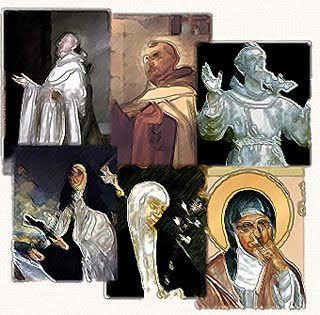Fr. Brian Murphy • July 9, 2025
CHAPTER 8
WERE THE SAINTS DELUDED?

In this materialistic and sceptical age, people can pompously declare that the great teachers of the mystical journey of love with God like Saints Paul of the Cross and Charles de Foucauld are deluded. They dismiss them as suffering from a weird form of mental sickness. Those critics sound like the flat earth believers of old. They close their eyes to the evidence.
I listened to an engineer talking about how she thinks. She sees everything graphically in three dimensions. She even sees the type and size of screws involved in the machine she has in mind. She can then create it exactly. Few of us can think like that. But it is one of the types of thinking within the wide range of human abilities. We gladly rejoice in her gift and benefit from its results. At the same time, we can study her methods and gradually develop our own engineering insights. It is the same with the saints.
To see the world exclusively in materialistic terms is an easy temptation in this age when physics and science in general are dazzling us with increasingly useful insights. People can be so impressed that they want to explain everything in mathematical and mechanical terms. We coin mottoes like ‘follow the science’, but science is a vast field in which there are often more questions than answers, and much admission of ignorance.
Some branches of science deal with human behaviour. These study and quantify how people act and feel and think. From this they seek to predict how situations and personalities will generally play out, but that is far from exact because there are “X factors” in every person which are unpredictable.
One of the branches of science which is most prone to difficulty in this regard is psychology. Often, from a purely materialistic point of view, it will deal only with the physical working of the brain and nervous system, the bio-chemistry involved in thought and emotions, and patterns of behaviour, in order to predict statistically how people will act - much of mental sickness is dealt with through medicine. Many psychologists refuse to deal with anything that cannot be measured. That automatically excludes the spiritual and mystical dimension of human beings. Their simplistic way of justifying their prejudice is to dismiss these experiences as delusion.
To view human behaviour and personal experience as simply material is rather like a person who can only conceptualise items in two dimensions. They would have no access to the experience and insights of the engineer I mentioned above. I experience a similar deficiency myself, because I am partially colour-blind. I can see colours, but they must be very different to how most people see them, because a lot of the time I do not understand what they are talking about. It would be folly for me to think that they are all deluded.
When people look at mystical experiences, such as those of St Paul of the Cross, and bracket them as delusion, they are demonstrating their own type of blindness, even folly. This is especially mystifying when there is so much evidence of the benefits of much of mystical experience. I trust other people’s colour sense because they exhibit such commonality, and it is obvious that they and others derive great benefits from their experience. I would love to paint, but if I tried people would laugh at my efforts. But I can still appreciate beautiful paintings and be inspired by them.
At the very least it would be right for sceptics or aggressive deniers to examine whether the countless mystical experiences benefit or hamper people. That is not to deny that there can be real delusion passing itself off as mystical experience, but here the strong teaching of the Church about discernment of spirits should be acknowledged. In a great book, Is Faith an Ilusion?, the former President of the Royal College of Psychiatrists, Professor Andrew Sims, demonstrates how people of faith generally live longer and are less prone to mental sickness than non-believers. He also states that more and more of his colleagues are abandoning their systematic dismissal of spiritual matters because they observe the evident benefits.
Nowadays, under the banner of ‘health and safety’ we spend so much time banning and avoiding troubling realities that we are in danger of losing the sense of adventure. There is no greater adventure than ‘exploration into God’.
I often see small children on the beach trying to create a pond in the sand. They then dash down with their buckets to fetch water from the sea and pour it in. But they are left with an empty crater, and give up. Fallen human beings are like that they sense the vastness of God like children sense that of the sea, and they try to reduce it to a scale that they can manage. You can’t manage God. Many of these small children have not been taught to swim, and shrink back from the waves. They do not know their own ability to float and move in the water. It is like that for those who shrink from the ‘exploration into God’.
